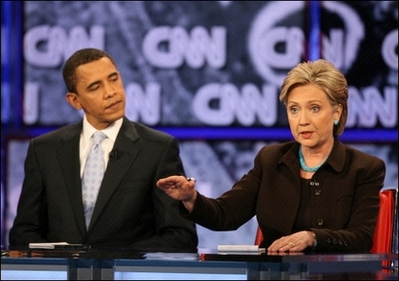Arianna Huffington
LA Debate: Hugs, Smiles, Laughs, Celebs, and a Defining Moment on Iraq




Some takeaways from the Democratic debate:
The Kodak Theater gave us a Kodak moment -- a post debate embrace that included beaming smiles -- that transcended the two hours of talking that preceded it. This was the first time the two leading candidates were alone on the stage, and the first time that you could see the two of them running together. The whole evening - save for a pointed exchange on Iraq -- had that vibe. And indeed, when Wolf Blitzer asked about the possibility of a "dream ticket" featuring the two of them, the question drew extended applause from the celebrity-filled crowd - and prompted a funny response from Obama who told Blitzer there was "obviously a big difference" between an Obama/Clinton ticket and a Clinton/Obama ticket. Tellingly, neither candidate rejected the notion. Indeed, after Obama gave an extended riff on what he'd look for in a running mate and members of his cabinet, adding that Hillary would make anybody's short-list, Clinton said, "I have to agree with everything Barack just said." Was this a preview of a night this summer in Denver, minus the falling balloons?
Early in the debate, it looked like it was going to be a big night for shoutouts to John Edwards. Obama kicked things off with an immediate mention in his opening remarks. Clinton followed suit in her own opening. She then quickly upped the ante with a second endorsement-luring mention of how her health care plan was similar to Edwards'. Obama matched that second mention with another of his own during a run about his -- and Edwards' -- fight against lobbyists... and there the Edwards Mention Count held for the rest of the night. Others getting mentioned frequently -- sharpening up for the general election, no doubt - were George Bush and John McCain.
Clinton definitely got off the top zinger of the night when, in response to a question about the possible Bush-Clinton-Bush-Clinton run of presidencies, she said: "It did take a Clinton to clean up after the first Bush, and I think it might take another one to clean up after the second Bush.
But despite talking a lot about her passion for health care reform and helping children, she seemed to get most excited when talking about the virtues of...the electronic medical records legislation she championed with Newt Gingrich and Bill Frist.
Question: did anyone spot Hillary's special "be there for me moment"? The Clinton campaign had held a contest, looking for someone to be Hillary's go-to eye contact person. "One of my favorite moments in any debate," wrote Clinton in an email blasted out to her list last week, "is when I look out into the audience and make eye contact with someone I know...Next Thursday, I want you to be that person. Would you come to an upcoming debate and be there for me in the audience?" I didn't spot any special meaningful glances during the debate. Perhaps it came when CNN was featuring one of the endless celebrity cutaway shots that gave the broadcast a bit of an awards show feel. Or maybe Hillary's special someone was, in fact, Garry Shandling. Or Steven Spielberg. Or Rob Reiner. Or Jason Alexander. Or Stevie Wonder (no, wait, that wouldn't work....)
The most engaging part of the debate had to be the extended, sometimes contentious, exchange over Iraq. It was the most effective sequence for Obama, and the most important for the country -- bringing Iraq off the backburner and placing it front and center, and highlighting the significant differences not only between Obama and Clinton but also between the Democrats and the Republicans.
Obama powerfully restated what is one of the essential themes of his campaign, that while it's important to be ready to lead from Day One, Clinton's mantra, it's even more important to be right on Day One. He deftly handled a question about the perceived success of the surge, saying that if the current situation in Iraq passes for success, then "we have set the bar so low it's buried in the sand at this point." And he neatly punctured the "the surge is working" meme by saying that over the last two years "we went from intolerable levels of violence and a dysfunctional government to spikes and horrific levels of violence and a dysfunctional government, and now two years later we're back to intolerable levels of violence and a dysfunctional government."
He then made the case that it would be better for the Democrats to nominate a candidate who could say that he had always been against the war.
For her part, Hillary struggled once again to explain and defend her vote to authorize the use of force, saying that she hadn't supported an amendment by Carl Levin that would have forced Bush to actively pursue diplomacy before going to war because it wouldn't set "a good precedent." And she insisted that she had done an "enormous amount of investigation and due diligence" before casting her vote -- despite the fact that the record shows that she never availed herself of the opportunity to read the classified portions of the NIE that convinced Sen. Bob Graham, the head of the Intelligence Committee at the time, to vote against the authorization.
But the lasting impression of the night may turn out to be not the differences between them, but the sense of them possibly coming together to take on McCain and the GOP.





























Posted January 31, 2008 | 11:59 PM (EST)